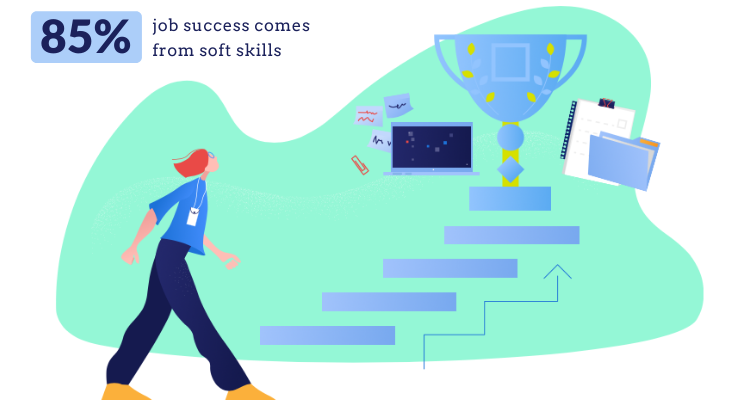
Written by Monal Jaiswani• February 24, 2021

Every person brings different talents to the table, but not all skills are created equal. While the focus tends to be on technical abilities, degrees, and certifications, these will only take an individual so far. Developing strong
soft skills will truly boost an individual’s performance and ultimately result in higher organisational growth.
Individuals possess a wide range of skills. All of these skills can be grouped into two main categories - hard skills and soft skills.
Hard skills are the ones that go on your resume. They are the tangible and measurable skills that employers look for in a candidate. Hard skills include technical knowledge such as computer programming, writing, and analytical skills. These abilities are easily demonstrated through certifications, college degrees, or past work experience.
Soft skills are more difficult to measure. Soft skills include communication, leadership, creativity, adaptability, problem solving and many more.
Hiring an employee with a strong work history and experience is important. It’s how most employers gauge whether a potential candidate will be the right fit for your open position. Unfortunately, selecting the candidate with the most
technical talent isn’t always the best choice. It’s equally important to find a candidate who has a good balance of hard and soft skills. When surveyed, ninety-seven percent of employers stated that soft skills are equally or more important than hard skills.
Consider this scenario. Mike is looking for a new software engineer and has narrowed his selection down to two candidates. One candidate has an amazing technical background and has completed some impressive projects over their career. Mike’s only concern is that they appear to be a lone wolf and prefer to work alone. The other candidate has less technical experience but seems to have strong interpersonal skills. Since the job requires a lot of interaction with the development team, having someone who will be a team player is extremely critical. Mike decides to play it safe and go with the candidate who looks best on paper. Six months later, there is tension within the team. The new software engineer has ruffled feathers and collaboration is suffering.
This scenario is all too common. In fact, forty-six percent of new employees fail within 18 months due to a lack of soft skills.
A lot of effort goes into building and developing hard skills. Since soft skills are just as important, why are they often overlooked or neglected?
Soft skills are often subjective and their effectiveness depends on the individual, team dynamics, boss’s management style, and company culture. To quote the legendary management consultant Peter Drucker, “You can’t manage what you can’t measure”. While some personality-type tests allow you to get a general sense of an individual’s soft skills, you usually don’t get to experience an employee’s soft skills until you hire them and observe how they work and interact with others. For many hiring managers, this can feel like a shot in the dark.
Many schools and universities focus primarily on teaching hard skills. There are two reasons for this. First, these institutions are often judged by their ability to produce graduates who are competitive in the job market. Since hard skills are easier to market on a resume, these are the primary focus. Second, soft skills are more difficult to teach using traditional methods like classrooms and books. Soft skills rely on interactions with other people and experiences. Teaching soft skills requires that learners are put in life-like situations, where they can try out approaches, understand consequences, get feedback and improve for the next situation that involves this skill. In a classroom environment, providing every learner with such an experience becomes difficult.
While many employees develop their soft skills on the job, relying on feedback loops in a live, work environment can be risky. A safe alternative would be hiring a coach to conduct in-person training. These trainings typically involve interactive sessions and roleplaying that allows employees to test out their soft skills and get feedback from an experienced observer.
Programs like LeadUpp's Aurelius training are a great way to let employees put their soft skills to the test in a fun and interactive web-based environment. Set in a medieval realm, the game allows users to complete various tasks and quests that teach users to leverage their soft skills and get instant feedback. This approach also keeps employees engaged and helps them retain this new information more effectively than traditional training or books.